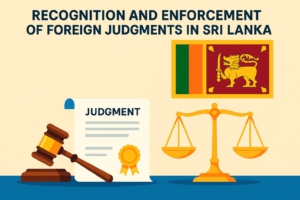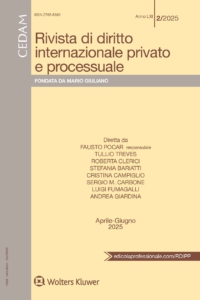Views
Foreign Sovereign Immunity and Historical Justice: Inside the US Supreme Court’s Restrictive Turn in Holocaust-Related Cases

By Livia Solaro, PhD candidate at Maastricht University, working on the transnational restitution of Nazi-looted art
On 21 February 2025, the US Supreme Court issued a ruling in Republic of Hungary v. Simon,[1] a Holocaust restitution case with a lengthy procedural history. Delivering this unanimous decision, Justice Sotomayor confirmed the restrictive approach to cases involving foreign states inaugurated in 2021 by Federal Republic of Germany v. Philipp.[2] In light of the importance of US practice for the development of customary law around sovereign immunity,[3] and its impact on questions of historical justice and transnational accountability, the Simon development deserves particular attention. Read more
Legislative direction for recognition of foreign judgments in Sri Lanka: A new sign-post in the private international law landscape
This post was written by Rose Wijeyesekera, Professor of Private and Comparative Law, Chair / Department of Private and Comparative Law – Faculty of Law, University of Colombo

Introduction
Sri Lanka (formerly known as ‘Ceylon’) is an island in the Indian Ocean, and is home to a total population of 21,763,170, consisting of Sinhalese 74.9%, Tamils 15.4%, Muslims 9.3%, and 0.5% consisting of others such as Veddhas, Burghers, and gypsies.The legal system of this island nation is a unique blend of native laws and the laws that were placed by the colonial powers from 1505 to 1947, when the country gained independence. Since then, Sri Lanka has been a democratic republic and a Unitary State governed by a constitution. The Sri Lankan legal system is primarily based on Roman-Dutch law, inherited from its colonial past under the Dutch, and English common law introduced by the British colonial rulers. Apart from these two, the legal system incorporates elements of Kandyan law (representing indigenous customs of the Sinhalese), Tesawalamai(customary laws of the Tamils of the Northern province of the country) and Muslim law. These personal laws apply in matters of personal law, such as marriage, divorce, and inheritance, depending on the community to which an individual belongs. All Muslims including the sub-categories such as Moors and Malays, are governed by Muslim Law in their personal matters, while Kandyan Sinhalese (a minority of the Sinhalese who hail from “Kandyan Provinces” / the hill country, are governed by Kandyan Law. These customary laws bear a territorial and/or a religious nature. Most of these laws are enacted, but some remain open leaving room for judicial interpretation. The court system in Sri Lanka is structured hierarchically and is designed to ensure justice through a combination of traditional and modern legal principles. The system comprises the Supreme Court at the apex, the Court of Appeal, Provincial High Courts, District Courts, Magistrate Courts, and tribunals such as Labour Tribunals, Quazi Courts, and Mediation Boards. Read more
South Africa Grapples with the Act of State Doctrine and Choice of Law in Delict
By Jason Mitchell, barrister at Maitland Chambers in London and at Group 621 in Johannesburg.
The Supreme Court of Appeal delivered judgment today in East Asian Consortium v MTN Group. The judgment is available here.
East Asian Consortium, a Dutch company, was part of the Turkcell consortium. The consortium bid on an Iranian telecommunications licence. The consortium won the bid. East Asian Consortium alleged that it was later ousted as a shareholder of the ultimate license holder, the Irancell Telecommunications Services Company. East Asian Consortium sued, amongst others, several subsidiaries of the MTN Group, a South African telecommunications company, in South Africa. East Asian Consortium alleged that the defendants unlawfully induced the Iranian government to replace East Asian Consortium with one of the MTN subsidiaries. Read more
News
Call for Papers: 4th APILA Conference, Doshisha University (Kyoto, Japan), 13–14 December 2025
The fourth annual APILA Conference will take place in person at Doshisha University in Kyoto (Japan) on Saturday 13 (Day 1) and Sunday 14 (Day 2) December 2025. The APILA Conference will be in the form of two days of roundtable discussions in English. Persons whose abstracts have been selected (see next paragraph) will deliver oral presentations in turn on Days 1 and 2. Each presentation will run for about 10 minutes and be followed by a discussion of about 10 to 15 minutes in which participants will have the opportunity to comment on the presentation. The objective of the APILA Conference is to assist presenters to refine prospective research papers with a view to eventual publication. Read more
Rivista di diritto internazionale privato e processuale (RDIPP) No 2/2025: Abstracts
 With a slight delay – entirely due to myself – I am pleased to announce the release of the second 2025 issue of the Rivista di diritto internazionale privato e processuale (RDIPP, published by CEDAM). This issue features:
With a slight delay – entirely due to myself – I am pleased to announce the release of the second 2025 issue of the Rivista di diritto internazionale privato e processuale (RDIPP, published by CEDAM). This issue features:
Francesco Pesce, Associate Professor at the University of Genoa, Il riconoscimento delle decisioni straniere in materia civile tra previsioni sulla competenza funzionale del giudice interno e comunicazioni alla Commissione europea (Recognition of Foreign Decisions in Civil Matters between Provisions on the Functional Jurisdiction of National Courts and Communications to the European Commission; in Italian) Read more
Virtual Workshop (in English) on September 2, 2025: Eva Lein on “PIL and dispute resolution in times of crisis”

On Tuesday, September 2, 2025, the Hamburg Max Planck Institute will host its monthly virtual workshop Current Research in Private International Law at 11:00 a.m. – 12:30 p.m. (CEST). Professor Eva Lein (Lausanne University) will speak, in English, about the topic
“PIL and dispute resolution in times of crisis”
In times of polycrisis, the law is put to the challenge. In international commercial transactions the question is how law can safeguard commercial activity, avoid a plethora of disputes, and encourage a pragmatic legal environment conducive to global economic recovery. This contribution discusses how dispute settlement mechanisms and private international law can be used to responsibly manage disputes in this context and to appropriately respond to future crises.
The presentation will be followed by open discussion. All are welcome. More information and sign-up here.
If you want to be invited to these events in the future, please write to veranstaltungen@mpipriv.de.



